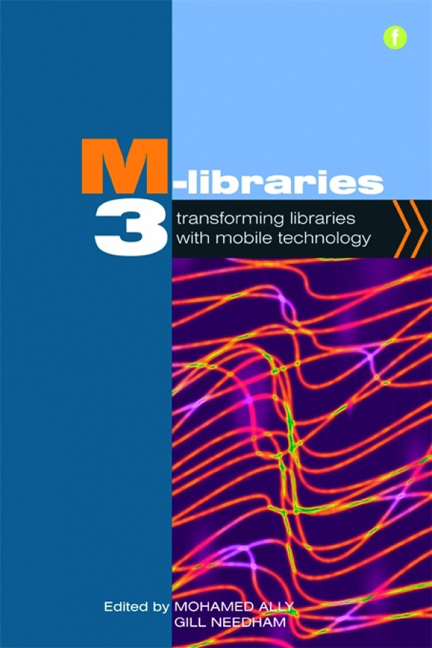Foreword
Published online by Cambridge University Press: 08 June 2018
Summary
I had the distinct privilege of being invited to provide the opening keynote for the Third International M-libraries Conference in Brisbane, Australia (11–13 May 2011). The conference theme, ‘Mobile Technologies: Information on the Move’, explored and shared work carried out in libraries around the world to deliver services and resources to users ‘on the move’ via a growing plethora of mobile and hand-held devices. Previous M-libraries Conferences (2007 Open University in the UK and in 2009 co-hosted by the University of British Columbia and Athabasca University) laid the foundations for international conversations about the challenge in libraries to meet the needs of the mobile user.
As the Conference acknowledged, we are seeing the emergence of a new user dynamic, as evidenced in the plethora of mobile devices as well as the app, smartphone and mobile culture that has started to pressure traditional and innovative institutional libraries to address and support the mobile user.
These proceedings share some of the presentations and research that was presented at the Third M-libraries Conference. My own keynote is available as a Slideshare and on my blog, Stephen's Lighthouse.
Over the years, we have learned that mobility has the power both to enhance the library experience and to disrupt. At this conference we explored how to tell the difference between an opportunity and a threat. What are the opportunities in learning, research, education, management, etc.? From my point of view there have been a few strategic shifts that Foreword Stephen Abram are caused, or at least magnified, by the mobile revolution. revolution. And these changes are just in their nascent stages at this point. They include:
■ the shift from desktop/laptop environment to one that is designed for a small screen and sound
■ the shift from potentially shared network devices (desktops and laptops) to truly personal devices
■ the shift to a sharing and collaboration ecosystem from one that is a constrained networked architecture but founded in personal social and professional networks with permeable boundaries
■ the shift from enterprise-controlled architecture and machines to personally controlled and owned devices
■ the shift to an information and communication ecology that is global rather than one that is bounded by institutional or national cultural norms and rules.
- Type
- Chapter
- Information
- M-Libraries 3Transforming libraries with mobile technology, pp. xxv - xxviiiPublisher: FacetPrint publication year: 2012



